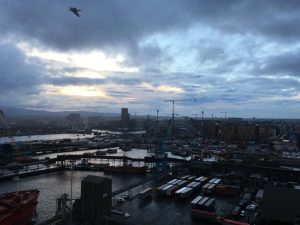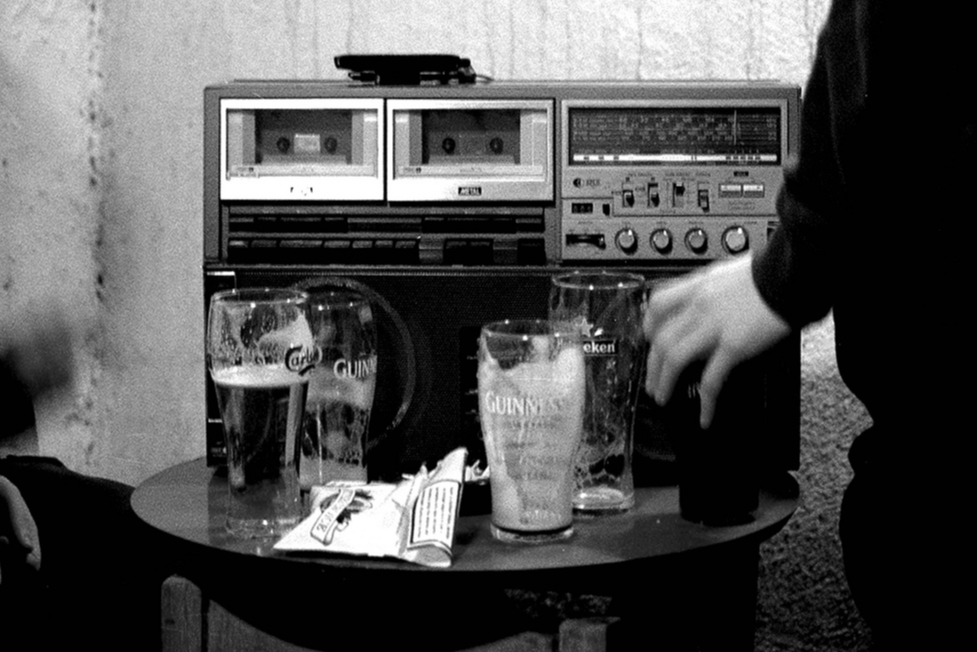Last Orders at the Dockside
Last Orders at the Dockside
A new play by Dermot Bolger
Premiered at the Abbey Theatre, Dublin, as part of the 2019 Dublin Theatre Festival.
 Following the death of an elderly docker in 1980, his friends gather in the local pub, The Dockside, to celebrate his life.
Following the death of an elderly docker in 1980, his friends gather in the local pub, The Dockside, to celebrate his life.
Emotions run high and a powder keg of friction comes to a head as a dockland community come to terms with the challenge of building new lives when old ways get swept away.
Over the course of an evening awash with songs, sharp Dublin wit and tales of life on the Docks, hidden tensions expose fault lines in their complex relationships.
After the success of Ulysses, Dermot Bolger and Graham McLaren reunite to present this Dublin Port Commission as part of the Dublin Theatre Festival 2019.
The play ran from the 23rd of September to the 26th of October on the Abbey Stage. The Abbey Theatre’s First Free Preview scheme allowed people who might not ordinarily have the chance to frequent the National Theatre to attend the first performance of this play for free on September 23rd if they simply queued for tickets in advance on the night.
Author’s Note About First Production
With Dublin’s docklands now changed beyond recognition and ships unloaded out of sight, it is hard to imagine how groups of men once clustered at dawn to seek work at hiring spots, known as “reads”, all along the Liffey from the Customs House and City Quay down to the Point Depot. On Sir John Rodgerson’s Quay dockers crammed into the wind tunnel that was caused by the gasometer to hear a foreman shout out the nicknames of whatever men were chosen to unload coal boats that day. We see zero hours contracts as a modern phenomenon but this concept sums up life in the early 20th Century for dockers – especially for those who were not unionised “buttonmen”, entitled to always be chosen before less fortunate men who could only dream of possessing such a button worn like a stud on their leather belts.
Back then dockers needed not just enormous strength, but “enormous antennae” to guess what ships were due, because they only got one chance to find work. Before dawn men would gather at Butt Bridge to scan the quays to see which shipping companies had vessels moored, or else they visited “early house” pubs in search of news about what firms might be hiring that morning.
In 1980, when Last Orders at the Dockside is set in such a pub on the verge of closing down, this way of life was in the process of being swept aside by the advent of container trucks, with fewer dockers needed to discharge cargos. Working conditions had improved, but the remaining dockers knew that the skills they had learned from their fathers – which had once sustained thriving communities on both sides of the river – were now becoming obsolete.
However a community does not simply vanish, just because its jobs are vanishing. The families in Last Orders face the end of one way of life, but they are also immersed in living new lives in a fractured Ireland on the cusp of great social change. Seven months previously the Pope had arrived to – as wags wryly remarked – “Kiss the ground and walk on the women”. Unemployment and wildcat strikes were rampant. The East-Link Toll Bridge was not yet open. Divorce was an impossibility. Charles Haughey had addressed the nation, telling us we were living beyond our means. His bill was being enacted to legalise contraception, but only if a woman could find a doctor willing to be paid to write a prescription and a chemist willing to fill it.
Yet the first working class generation to experience free Secondary education were making themselves in bands like The Blades from Ringsend. Pirate radio stations filled the airwaves. Art centres and magazines sprang up. Not just on the Dublin docks but across Ireland – amid that maelstrom of change, amid family arguments, private griefs and triumphs, and against the soundtrack of songs people sang – a different nation was evolving.
A decade later in 1990, Ireland’s soccer team at Italy ‘90 sent national pride soaring with a sense of collective joy. In a smaller way in 1980, in a time of chronic unemployment and divisive social upheaval, Johnny Logan’s unexpected success in the Eurovision (on the night when the play is set) also provided an unexpected benediction. It became a night when people momentarily forgot their everyday cares and, in those moments as victory hovered, a nation held its collective breath.
As a child I saw the Dublin docks as a hidden world into which my seafaring father vanished on his weekly voyages. Writing Last Orders at the Dockside allowed me to follow him through the port gates and into the sort of pub where he drank with dock workers. It is a celebration of their stories that form part of our history and belong on the stage of our national theatre.
My sincere thanks to Dublin Port who commissioned this play as part of their engagement with the arts; to everyone in the docklands community who shared their memories with me; to everyone in the Abbey Theatre who worked so tirelessly to bring it to the stage, most especially the play’s director, Graham McLaren, to the actors and magnificent musicians who turned every performance into a celebration, to the Dublin dockside community who packed out the Abbey (some making their first ever visit to our national theatre) and who often stayed on in the bar to continue the singing, and the Civitella Ranieri Foundation who awarded me a fellowship to write the first draft of this play while resident in their remarkable 15th Century castle in Umbria in Italy.
– Dermot Bolger
Tickets for this free performance are only available on the night, cannot be booked in advance, are limited to one ticket per person and distributed on a first come, first served basis.
Details and Rights
For rights enquiries please contact http://permissions.curtisbrown.co.uk/
The Abbey’s original production featured a live band as well as the full cast. However a shorter script is available where any music on stage is created by the cast themselves, either singing unaccompanied or playing acoustic instruments.
